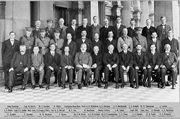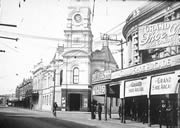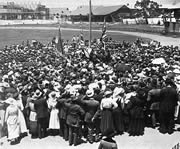

Sunday 3 March 8 pm
Presents a lecture entitled 'At the Court of King Coal,' concerning the coal combine that was forcing up the price of domestic fuel. 1
This lecture was part of the Australian Labor Federation’s Sunday night propaganda program, 'which was going to be moved to an enclosed hall when the weather turned cooler. The Westralian Worker offered to help with the costs of establishing an orchestra to open the meetings or to at least have a piano.'2Tuesday evening
12 March
Attends a meeting of the Organisation of Labor Women. 3
'Curtin addressed the group … doubtless stressing the need for them to be integrated into the socialist struggle rather than fighting for a separate feminist agenda. … in Curtin’s view, there was no basic conflict of interest between men and women, only between workers and the forces of capitalism.'4Speaks on the ‘Coal Barons’.
An orchestra opens the proceedings before he 'enthralled his large audience with a description of the operations of the financial brigands.'6Wednesday evening
10 April

JCPML. Records of Lloyd Ross. John Curtin at Press Censorship Conference, Melbourne, April 1918.
JCPML00633/11.
Courtesy National Library of Australia: MS 3939, Series 15, Box 67
Leaves by express [train] to attend the Press Censorship Conference in Melbourne. 7
A government-sponsored conference of newspaper editors, called together to discuss, 'the Government’s heavy-handed administration of the censorship regulations.' Over four days, 'the editors agreed to protest at "‘the use of censorship for political purposes". Despite their protests, the censors continued to wield their power in ways that would have made the Kaiser proud. Curtin described the conference upon his return to Perth as ‘one of the most notable gatherings of the war.' 8
Curtin was granted leave from his role as Editor of the Worker by the Board of Directors of the People's Printing and Publishing Company at their meeting of the 28 March 1918.
That leave be granted to Mr Curtin and that he be asked to make arrangements to carry on during his absence. 8a
Sunday evening 17 April
Melbourne |
Speaks at the regular Sunday night lecture of the Socialist Party, together with Adela Walsh (nee Pankhurst).
'After a playing of the "‘William Tell Overture"’ by the Socialist orchestra, and a short speech by Walsh attacking the Labor Party for supporting recruiting, Curtin launched into a long lecture that was described as an "oratorical treat"’. He reminded the audience that the primary struggle of the labour movement was not against the war but against capitalism…' and that his opposition to conscription and the war, 'was not due to pacifism.'915-18 April
Attends the Press Censorship Conference. 10

Fremantle 1920s: High Street looking
East towards the Town Hall.
Courtesy Fremantle City Library Local History Collection. Photo no.1663
Presents a lecture entitled ‘The People and Peace’.
The 'startling directness of his facts and exposition [held] the large audience from first to last.' 11
JCPML. Records of Lloyd Ross. John Curtin at Interstate Labor Conference, Perth,
17 June 1918 JCPML00799/3
Courtesy National Library of Australia: MSS 3939, Series 18, Folio box 82
Attends the triennial conference of the Federal Labor Party and appears as a 'proxy delegate for the cash-strapped Tasmanian Branch.' 12
'Curtin was active in the discussions, supporting unsuccessfully a motion to end the party’s support for compulsory military training for home defence.' 13
Attends a meeting of the Shareholders of the People's Printing and Publishing Company and is praised by the Chairman of the Board of Directors, Mr J.B. Holman.
With the Editor, Mr Curtin, his work had met with the approval of all Laborites of W.A. 13a
Sunday evening 14 July
Presents a Sunday night lecture entitled 'Pearce and Peace'.
'Preceding the lecture the musical programme was arranged by Mr H. Little’s company, and the items rendered were highly appreciated by the audience and received rounds of applause. The lecturer was in his best form.' 14Sunday evening 25 August
Chairs a meeting addressed by Senator Needham. 15
Edward Needham (1872-1956) was a Labor Senator from Western Australia from 1907 to 1920 and from 1923 to 1929. He also sat in the Western Australian Legislative Assembly from 1904 to 1905 and from 1933 to 1953. 16Sunday afternoon
1 September
Gives an address entitled 'Labor and the Last War.'
Sunday evening
1 September

Peace Service, Fremantle, November 12, 1918.
Courtesy Fremantle City Library Local History Collection Photo no. 1494H.
The First World War ends.
'For more than four terrible years the tumultuous flames of war have lit the sky with death … History has no parallel to the destruction that has been occasioned. The toll demanded of life and limb; the price paid in anguish of spirit and bafflement of high hope; the tears; the suffering; the terrific mortality of actual combatants; the actual and potential devitalising of civilisation itself, is too vast a computation for living men to make … It is enough for us to realise that the dishevelled glare of disaster ceases to hang terrible on high. Tomorrow must assuredly be a better and a fairer day." 18Attends a meeting of the Australian Labor Federation (ALP) State Executive and supports the case for One Big Union (OBU).19
The proposal for One Big Union, a body which would encompass all Australian workers, was initially enthusiastically supported by Curtin as a means of achieving working class unity. 20
However, in January 1919, the Australian Workers' Union gained a controlling interest in the Westralian Worker and Curtin found his freedom to write on the issue constrained.21